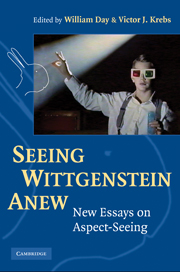Book contents
- Frontmatter
- Contents
- List of Contributors
- Acknowledgments
- Abbreviations of Wittgenstein's Works
- Seeing Wittgenstein Anew
- Introduction: Seeing Aspects in Wittgenstein
- I ASPECTS OF “SEEING-AS”
- II ASPECTS AND THE SELF
- III ASPECTS AND LANGUAGE
- IV ASPECTS AND METHOD
- IV.1 Therapy
- 11 On Learning from Wittgenstein, or What Does It Take to See the Grammar of Seeing Aspects?
- 12 The Work of Wittgenstein's Words
- 13 On the Difficulty of Seeing Aspects and the “Therapeutic” Reading of Wittgenstein
- IV.2 Seeing Connections
- Appendix: A Page Concordance for Unnumbered Remarks in Philosophical Investigations
- List of Works Cited
- Index
12 - The Work of Wittgenstein's Words
A Reply to Baz
Published online by Cambridge University Press: 05 June 2012
- Frontmatter
- Contents
- List of Contributors
- Acknowledgments
- Abbreviations of Wittgenstein's Works
- Seeing Wittgenstein Anew
- Introduction: Seeing Aspects in Wittgenstein
- I ASPECTS OF “SEEING-AS”
- II ASPECTS AND THE SELF
- III ASPECTS AND LANGUAGE
- IV ASPECTS AND METHOD
- IV.1 Therapy
- 11 On Learning from Wittgenstein, or What Does It Take to See the Grammar of Seeing Aspects?
- 12 The Work of Wittgenstein's Words
- 13 On the Difficulty of Seeing Aspects and the “Therapeutic” Reading of Wittgenstein
- IV.2 Seeing Connections
- Appendix: A Page Concordance for Unnumbered Remarks in Philosophical Investigations
- List of Works Cited
- Index
Summary
I'm grateful for the chance to respond in public to Avner Baz's most recent essay on my work – primarily because it gives me an opportunity to express my gratitude for his willingness to engage with that work in detail, and to re-engage with it over the years; it's heartening to know that a gifted and dedicated philosopher considers such an investment of time and effort to be worth his while. I'm also glad to see that, particularly in the present essay, he finds himself focusing on issues surrounding Wittgenstein's work on seeing aspects that are also central to my own most recent attempts to go over this ground, more than a decade since I first staked out a set of claims about it. Since, however, he seems to judge that these re-presentations of my original thoughts about Wittgenstein's work bring those issues into focus precisely by failing properly to observe the methodological precepts that (we both assert, and accept) are integral to its teaching, I hope I will be forgiven for finding this portrayal of my failings rather more than disheartening. Such a rebuke is, after all, particularly pointed when addressed to someone who has made it his business (in the larger book in which my recent words on seeing aspects find their place, and elsewhere) to address exactly such rebukes to other writers on Wittgenstein. For some reason, recalling that those who live by the sword, die by the sword, doesn't serve to blunt its edge.
- Type
- Chapter
- Information
- Seeing Wittgenstein Anew , pp. 249 - 267Publisher: Cambridge University PressPrint publication year: 2010
- 3
- Cited by

